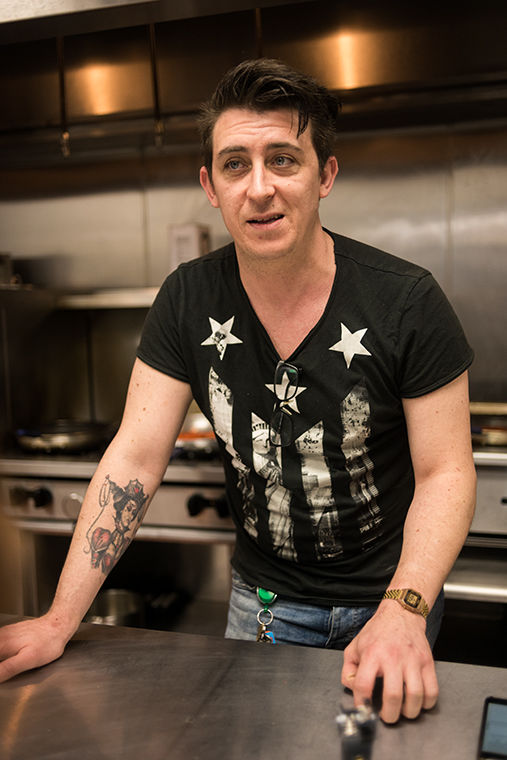Authentic Italian polenta meets American fast dining
May 1, 2017
The smell of fresh pesto wafts from the kitchen as Emile Chalouhi and Camillo Villa huddle over the stainless steel kitchen island, weighing ingredients on a small scale and exchanging banter in Italian.
It is early afternoon at The Polenta Bar in the West Loop. White chairs and tables sit empty as the restaurant undergoes renovations to make the environment “more Milanese,” according to Chalouhi, the owner and Milan native.
The Polenta Bar, 1002 W. Lake St., opened in March and serves high-quality polenta in the manner that Americans commonly enjoy their food: á la fast-casual. Polenta, ground corn cooked with boiling water and oil or butter, comes from Northern Italy’s Lombardia region, where it is a staple dish served with meat, vegetables and sauce.
“We chose polenta because there is not something like this in all of the U.S. and because American people usually know the [Italian] kitchen of the south because of immigration,” said fellow Milanese Villa, head chef, whose dream had always been to come to the U.S. “It will be good because the Chicago area is famous for corn [grown] in the Midwest.”
The restaurant’s Chipotle-style bar lets customers select fresh toppings to add to their polenta, which traditionally takes three hours to cook and requires continuous churning to prevent lumps.
Chalouhi said the restaurant will reopen May 15 with a cleaner, more architectural look is true to its Milanese roots. A new seasonal menu on LED screens, dimmer lights and brick walls to represent a fireplace—the way polenta used to be cooked—will also be added.
He shared that he chose to open the business in Chicago because of the large restaurant market, its cultural diversity and because his wife is from here. He said he is committed to upholding quality with fresh, organic ingredients, which is not the focus of other fast dining.
“The business aspect is passing [on] the concept that you can make [food] healthy, and everything is made fresh and can still be fast,” Chalouhi said.
Villa said the biggest culinary challenge has been adapting Italian recipes for American taste buds because he realizes Americans enjoy different flavors and are used to diverse food preparation.
“You have to find the middle ground that shares both so as not to ruin the Italian recipe, but also make it enjoyable to Americans,” he said.
Adding less salt or making sauces heavier with more garlic are small modifications Villa has made, but he said observing the customers and seeing what they want helps him best decide how to modify recipes.
“We want to bring a kind of kitchen that doesn’t exist here, but you have to cater to [customers’] tastes,” he said. “You can’t pretend that they serve you. That’s the job of the cook: We are here to serve people and cook food in a good method and not tell them what to eat.”
Massimo Di Vuolo, chef of Due Lire in Lincoln Square, is another fan of polenta, which he serves as a main dish or as a side of polenta fries, a popular twist to the recipe more common in Southern Italy, where he is from.
The Naples native said polenta’s tradition comes from peasant culture and was made in abundance to share with family or friends. He said The Polenta Bar seems true to the tradition and will attract younger people with its serving line that offers swift customization, a trend he sees in his hometown.
Educating Americans on authentic Italian dishes is important for their understanding of culture, Di Vuolo said, and having more Italian restaurants like The Polenta Bar will expand people’s horizons.
“We need more places that are willing to take a chance [and] move away from the traditional Chicago-style Italian food, where people think Italian food is pasta with sausage or dishes that we don’t serve in Italy, like chicken Vesuvio or fettuccine Alfredo,” he said. “Once you open the door to their palate, it is a good thing because they expand what they like or know.”
The goal of the Polenta Bar is to bring authenticity back and deliver genuine Italian recipes that are not Americanized, Villa said.
“The thing that distinguishes us is we are really Italian and the recipe is Italian,” Chalouhi said.








